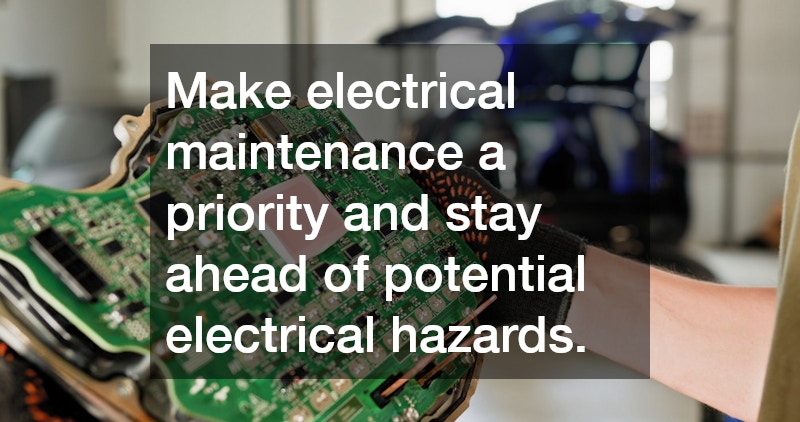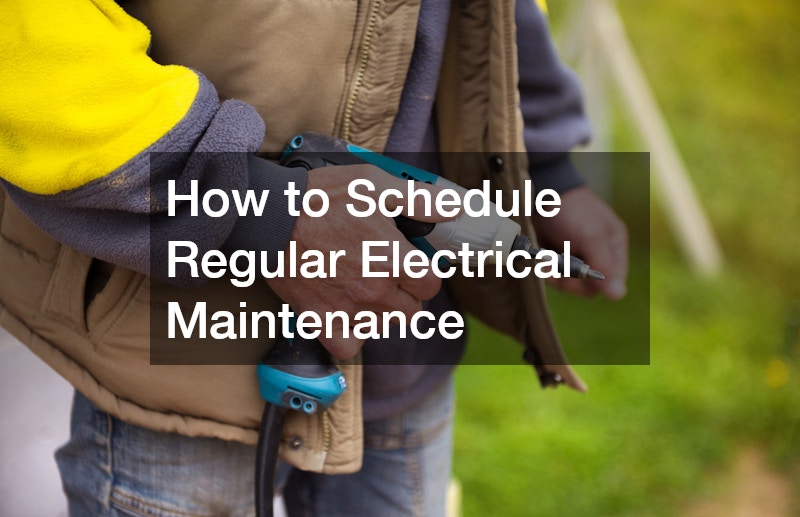Ensuring the safety and efficiency of your electrical systems is crucial in both residential and commercial properties. Electrical maintenance is an essential part of protecting your investment, preventing costly repairs, and reducing the risk of electrical hazards. However, many property owners struggle with how to schedule regular electrical maintenance effectively.
This article will guide you through the process of planning and organising consistent electrical maintenance, ensuring your property remains safe and compliant with Australian standards.
Understanding the Importance of Electrical Maintenance
Electrical systems, whether in homes or businesses, are complex and require periodic checks to function correctly. Over time, wear and tear can cause components to degrade, potentially leading to failures or dangerous situations such as electrical fires or shocks. Regular electrical maintenance helps identify issues early, preventing unexpected breakdowns and extending the lifespan of your electrical installations.
In Australia, compliance with safety standards like AS/NZS 3000 (the Wiring Rules) is mandatory. Scheduling electrical maintenance ensures that your property adheres to these regulations, protecting both occupants and your legal liability. Additionally, well-maintained electrical systems can improve energy efficiency, lowering utility costs and contributing to environmental sustainability.
When to Schedule Electrical Maintenance
Determining the right frequency for electrical maintenance depends on several factors including the type of property, its age, and the complexity of the electrical system. For residential properties, an electrical inspection every two to five years is generally recommended. Older homes, especially those with outdated wiring, may require more frequent checks.
It is also important to schedule maintenance following significant electrical work or after any electrical faults or incidents. Immediate inspection and testing can prevent further damage or risk.
Choosing the Right Electrical Contractor
A critical step in scheduling regular electrical maintenance is selecting a qualified and reliable electrical contractor. Look for a professional with appropriate licensing and experience in maintaining similar types of properties or systems. In Australia, electricians must hold a current electrical licence and comply with state or territory regulations.
Ask potential contractors about their maintenance procedures and how they document their work. A reputable contractor will provide detailed reports outlining any faults found, repairs completed, and recommendations for future maintenance. This documentation is vital for tracking the condition of your electrical system over time and planning subsequent maintenance.
Furthermore, choose a contractor who offers flexible scheduling options that align with your availability and minimise disruption to your household or business operations. Clear communication and professionalism are key indicators of a trustworthy service provider.
Planning the Maintenance Schedule
Once you have engaged a suitable electrical contractor, work together to develop a maintenance schedule that suits your property’s needs. This schedule should include regular inspections, testing of safety devices such as residual current devices (RCDs), and servicing of critical components like switchboards, lighting, and wiring.
Consider incorporating maintenance dates into your calendar or digital reminder system to avoid overlooking them. Consistency is vital — irregular maintenance can lead to overlooked issues and increase the likelihood of system failure.
For businesses, integrating electrical maintenance into broader facility management plans can improve overall efficiency. This approach ensures that electrical checks are coordinated with other routine maintenance tasks, reducing downtime and scheduling conflicts.
Preparing for Electrical Maintenance Visits
Before the scheduled maintenance, it is helpful to prepare the site to facilitate a smooth inspection and minimise inconvenience. Ensure easy access to electrical panels, switchboards, and equipment. Clear any clutter or obstacles that might hinder the electrician’s work.
Inform household members or employees about the maintenance appointment, including any potential interruptions or safety precautions they should observe. In some cases, it might be necessary to switch off power temporarily to carry out certain tests safely. Planning for this in advance helps avoid surprises and allows you to arrange alternative power sources if needed.
What to Expect During Maintenance
During the electrical maintenance visit, the electrician will conduct a thorough inspection of the electrical system. This process typically involves testing circuits, checking for signs of wear or overheating, inspecting wiring and connections, and verifying the operation of safety devices.
If any issues are detected, the electrician will recommend repairs or replacements. It is important to prioritise these recommendations to maintain safety and system integrity. Regular electrical maintenance is not just about fixing problems but also about proactive care to prevent faults before they occur.
Benefits of Regular Electrical Maintenance
Adhering to a regular electrical maintenance schedule offers multiple benefits. Foremost among these is enhanced safety. Faulty wiring or damaged components can cause electrical shocks or fires, endangering lives and property. Regular checks significantly reduce these risks.
In addition, electrical maintenance can improve system reliability. This means fewer outages or disruptions, which is especially important for businesses that rely heavily on consistent power supply. Well-maintained electrical installations can also boost energy efficiency, potentially lowering electricity bills.
Finally, routine maintenance helps protect your investment. Electrical repairs can be costly, especially if problems escalate due to neglect. Maintaining your electrical system regularly ensures its longevity and functionality, saving money in the long run.
Prioritise Regular Electrical Maintenance for Safety & Savings
Scheduling regular electrical maintenance is a vital responsibility for every property owner. By understanding the importance of electrical maintenance, choosing a qualified contractor, planning a suitable schedule, and preparing adequately for maintenance visits, you can ensure your electrical system remains safe, efficient, and compliant with Australian standards. Regular maintenance not only protects your property and occupants but also contributes to long-term cost savings and peace of mind. Make electrical maintenance a priority and stay ahead of potential electrical hazards.
.




